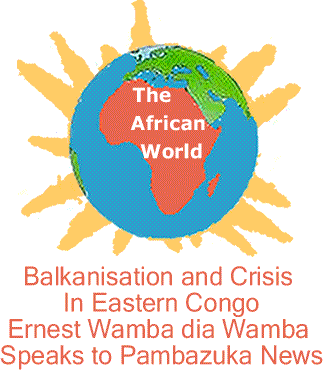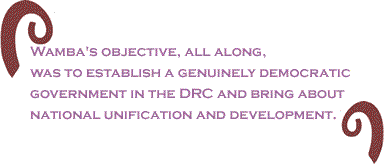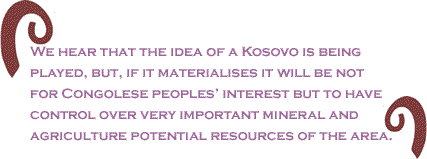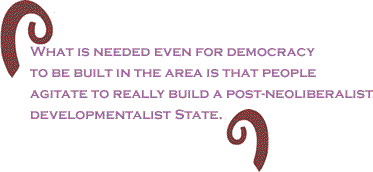
|
|||||||||||||||||||||||

|
|

Custom Search
|
|
 |
|
This is a reprint of a recent interview conducted by Pambazuka News with Congolese leader Ernest Wamba-dia-Wamba Introduction by --Bill Fletcher, Jr., BlackCommentator.com Executive Editor Wamba, as he is generally known, is a is a leading Marxist thinker and activist who spent many years in exile in the USA during the reign of the notorious Mobutu Sese Seku. Wamba returned to Africa in the early 1980s where he taught at the University of Dar Es Salaam in Tanzania. He remained active among Zairian/Congolese exiles, and was imprisoned when he returned to Zaire (now the Democratic Republic of the Congo) to bring needed medicine to his father. As a result of a successful and broad-based international campaign, Wamba was released and returned to Tanzania. In the mid 1990s, Wamba was part of the insurgency that resulted in the ousting of Mobutu. This insurgency represented a combination of indigenous Zairian/Congolese forces along with allies from Rwanda and Uganda. Rwanda was particularly concerned about the presence in the eastern Congo of Hutu militias and former government troops that had been involved in the 1994 anti-Tutsi genocide. The combination of the indigenous forces and their allies swept aside Mobutu's forces and succeeded in gaining power. Laurent Kabila, a long-time Mobutu opponent, was installed in office as a result of the military victory. Kabila soon proved to be a problem for both the Rwandans and Ugandans, on the one hand, and a segment of the revolutionary forces that overthrew Mobutu. A new insurgency/invasion took place with the objective of both finally eliminating the Hutu *genocidaires* as well as replacing Kabila. For Wamba the objective was introducing a genuinely democratic government in The DRC and uniting the country. As it turned out, these were not necessarily the objectives of the Rwandans and Ugandans. Quickly this second insurgency/invasion ran into problems. Angola and Zimbabwe sent troops to assist Kabila. The thrust from the east stalled, and the DRC became engulfed in what came to be known as Africa's first "world war." Wamba's objective, all along, was to establish a genuinely democratic government in the DRC and bring about national unification and development. In the course of the second insurgency/invasion,
he came to the conclusion Wamba has remained quite active in the struggle over the future of the DRC. He has had his job cut out for him. Despite a peace agreement and a national election, the DRC has not lived up to the promise of democracy and self-determined development. One of the richest countries on the planet—natural resources wise—has been repeatedly raped and kept subject to outside forces, including but not limited to multi-national corporations. BC reprints this interview and is very thankful that Pambazuka conducted it in the first place. We reprint it because of the dire situation in the eastern Congo that has recently flared up with an uprising by a former DRC military leader known as Laurent Nkunda. Wamba explains the context of this most recent crisis that has now been expanded with the reported reintroduction of Angolan troops fighting along side of the forces of the DRC national government. --Bill Fletcher, Jr., BlackCommentator Executive Editor -0- August saw a fresh outbreak of conflict in the DRC. Since then, approximately 250,000 have been displaced in the eastern part of the country. Following a brief cease-fire declared by the forces under the command of General Laurent Nkunda, fighting again erupted on the 4th of November. Ever since the 1994 Rwanda Genocide, and the subsequent wars that raged between 1996 and 2002, the country has hardly seen a moment's respite. The Kivu region has been the epicentre of the latest round of fighting. In an interview with Firoze Manji, Ernest Wamba Dia Wamba outlines the conditions necessary for a lasting peace in the DRC. Pambazuka News: After many years of silence about the killings in the DRC, the world's attention has suddenly turned to the current sweeping of Laurent Nkunda's forces around Goma. What's brought about this kind of attention? Wamba dia Wamba: I think that the change of the balance of forces on the terrain is part of the reason. The scope of the humanitarian catastrophe forces many western people connected with media, with humanitarian organisations and also the rising interest in the situation of the DRC around the US elections. One hears that the incumbent regime would like to create hot situations either to help the Republican candidate or to create faits accomplis for the new regime to deal with. Around certain universities in the US, for example, for the first time a trend has developed to take up the issue of the silence on killings in the DRC. And, we have to add also the need for Western capitalists, after the Chinese contract with the DRC government, to re-assume their control over the Congolese resources. We hear that the idea of a Kosovo is being played, but, if it materialises it will be not for Congolese peoples’ interest but to have control over very important mineral and agriculture potential resources of the area.
Pambazuka News: The mass media in the West predictably seeks to portray the conflict as tribal. But what is this conflict about? What are the political and economic factors behind the conflict? Wamba dia Wamba: Tribal differences have never been a cause of conflict; other conditions must prevail to transform differences into discriminations and these to lead to conflicts. There are of course many unresolved issues since the Rwandese genocide took place and many, including genocidaires, moved massively to the DRC as recommended by the international community. Nkunda, for example does use the presence of the FDLR [Forces Démocratiques de Liberation du Rwanda], still committed to retake power in Rwanda and perhaps carry out genocide, as one reason for his war. The truth of the matter is that we have to distinguish between the main objective, access and control over the resources, and the conditions facilitating that objective, the existence of genocidaires creating havoc on innocent people, the sentiments of exclusion still felt by the Tutsi Congolese, the involvement of the DRC government with those genocidaires – used as the government's marines, according to some – and the possible alliances between business people aligned with government officials of states in the region. Most of our regional governments are actually led by security officers allied to businessmen. It is said that Rwandese businessmen, among others, have been financing Nkunda to keep control of the mines and continue exploit minerals – coltan, niobium, etc – very much sought by transnational enterprises producing or distributing mobile phones, satellites, etc. The subsoil of the whole of the DRC has almost been sold out with contracts to so-called partners. Quite a few family members of people in power, from the summit on, find themselves on those contracts. One suspects that in zones where there is no firm control by any state, weapons decide everything. In a sense, Kivu is now the weakest link of the globalisation’s chain. We need to identify the different contradictions converging there. The absence of a real state authority, apparently willed by some who are in the State, facilitates the agents of the world economy of crime. Pambazuka News: What are the roles of Rwanda, Uganda, Zimbabwe and Angola in this conflict? What's in it for them? Wamba dia Wamba: After having experienced the destabilisation of a Mobutist gendarme state, many neighbouring countries would rather prefer having a weak Congo around, especially if they can even benefit from that weakness by engaging also in the looting of resources of the Congo. The invisible alliances in business facilitate that kind of pursuit. Certain officials in Uganda and in Kinshasa at some point did have joint business going on. Rwanda has an interest it uses contradictorily: the presence of the genocidaires to claim that its security is threatened and to keep a situation of anarchy to have access to resources on which its businessmen have been enriching themselves. Their participation in the last two rebellions made them taste the resources available in Congo and in fact want to continue enjoying them in one way or another. The task of organised government in Kinshasa would have been to find ways of legalising participation in the common exploitation of resources. This process has been very slow and one feels that the anarchy is found more profitable in the short run.
Pambazuka News: The European Union and other countries are deeply engaged in exploitation of the DRC's resources. To what extent are they culpable in the current crisis? Wamba dia Wamba: Certain transnational enterprises were identified by the UN panel some time back: Anglo-America, Standard Chartered Bank, De Beers, etc. The nature of the minerals being exploited in the area can only be used by advanced enterprises and Africans are just intermediaries. The campaign against the DRC-China contract by the West is an indication of their willingness to control the Congo resources. The sad part is that profitability through bloody coltan being higher, they do not really care about the life of the innocent Congolese, only to reduce the miseries through so-called humanitarian punctual aid and not to eradicate violence altogether. Pambazuka News: Are we witnessing the 'Balkanisation' of the DRC? Wamba dia Wamba: The rebels are occupying an area of about 3 territories. It is not clear whether in negotiations they will accept to give it up. If the DRC government does not succeed in getting that territory back and if external forces support the keeping of the territory by the rebels, a small but very rich country will be formed and the impact on the rest of the country may lead to a real balkanisation. The government is being asked not to give up to that demand if formulated. Congolese people are firm for their territorial integrity. Pambazuka News: Does the Kinshasa government have any control of the situation? Wamba dia Wamba: Not really, that is why it has being criticising the MONUC for its own failure to arrest the war. Because of the nature of leadership we have, mostly interested in looting resources and staying in power, condoning impunity, etc.; institutions hardly function. Most of what it promised to do is not being done, including national reconciliation and building of a real national army. Even the new government being sworn in does not seem to inspire confidence in the population. Many useless dead-woods have been but behaving as if the republic is their private propriety – the so-called the parallel government have been re-included.
Pambazuka News: What should be the response of pan-Africans to the present situation? Wamba dia Wamba: Call for a regional African Peoples’ conference, if there is a way to make this happen. What is needed even for democracy to be built in the area is that people agitate to really build a post-neoliberalist developmentalist State. In the short run, we should agitate against any possible Balkanisation, for the application of the Nairobi agreements, for the exchange of embassies between the DRC and its neighbours, Rwanda and Uganda, and for an urgent humanitarian intervention. * Professor Ernest Wamba dia Wamba is honorary senator and vice-president of the Organizing Power of the Kongo University. * Firoze Manji is editor in chief of Pambazuka News and director of Fahamu – Networks for social justice. * Please send comments to [email protected] or comment online at www.pambazuka.org/ |
|
Any BlackCommentator.com article may be re-printed so long as it is re-printed in its entirety and full credit given to the author and www.BlackCommentator.com. If the re-print is on the Internet we additionally request a link back to the original piece on our Website. Your comments are always welcome. eMail re-print notice
If you send us an eMail message we may publish all or part of it, unless you tell us it is not for publication. You may also request that we withhold your name. Thank you very much for your readership. |
|
| |
|
| Novmber 13, 2008 Issue 299 |
|
| Executive Editor: Bill Fletcher, Jr. |
| Managing Editor: Nancy Littlefield |
| Publisher: Peter Gamble |
| Est. April 5, 2002 |
Printer Friendly Version
in resizeable plain
text format or pdf
format. |
| Frequently Asked Questions |
 |

|
 |
 |
 |
| |
| |








































